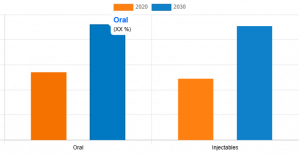Surging Demand for Innovative Therapies Drives Growth in Global Ulcerative Colitis Market
Global Market to Hit $10.8 Billion by 2030, Fueled by Rising Disease Prevalence and Advancements in Drug Development
PORTLAND, OR, UNITED STATES, July 18, 2025 /EINPresswire.com/ -- The global ulcerative colitis market is poised for robust growth, projected to reach $10.8 billion by 2030, expanding at a compound annual growth rate (CAGR) of 5.7% over the forecast period (2021–2030), according to a newly released market analysis. This significant expansion is attributed to surging cases of inflammatory bowel diseases, technological innovation in drug development, and expanding healthcare access across emerging economies.Get a Sample Copy of this Report: https://www.alliedmarketresearch.com/request-sample/3965
Ulcerative colitis (UC)—a chronic immune-mediated inflammatory gastrointestinal condition—continues to be a pressing global health issue, particularly affecting individuals between 15 and 30 years of age. While the exact cause remains idiopathic, the burden of UC is growing steadily, driving demand for targeted and responsive treatments globally.
“Ulcerative colitis is no longer a regional medical concern. It has become a global issue, particularly with lifestyle and environmental changes contributing to rising incidence,” said Dr. Aarti Menon, a gastroenterology researcher at Global MedInsights. “The silver lining is that we’re seeing an unparalleled era of innovation in UC therapeutics.”
Key Market Drivers
Rising disease prevalence: Over one million Americans are estimated to be living with UC, a number that’s steadily rising year over year.
Drug pipeline advancements: Companies like Bristol Myers Squibb received FDA approval for novel drugs like Zeposia in 2021, offering new hope for moderate to severely active UC patients.
Increased R&D and biologic innovation: Pharmaceutical giants are doubling down on biologics and small molecule development fueled by promising clinical trial results.
Segmentation Insights
Route of Administration:
– Oral drugs dominated the market in 2020 due to patient convenience and adherence.
– However, injectables are projected to grow the fastest (CAGR 6.4%) as biologic therapies gain traction.
Disease Type:
– Mild UC accounted for the largest market share in 2020.
– The moderate UC segment is anticipated to dominate through 2030, driven by increasing proctitis cases and mid-level inflammation treatment demand.
Molecule Type:
– Small molecules held the majority share due to affordability and accessibility.
– The biologics segment is witnessing accelerated growth, thanks to expanding use in personalized medicine and precision targeting.
Regional Outlook
North America led the ulcerative colitis market in 2020, with extensive pharmaceutical activity and early access to breakthrough therapies.
Asia-Pacific is forecasted to experience the fastest growth (CAGR 6.5%), driven by rising IBD prevalence, policy reforms, and expanding clinical research infrastructure in countries like China, India, and Australia.
Industry Leaders
Key players shaping the competitive landscape include:
Abbott Laboratories
Ajinomoto
AstraZeneca Plc
Eli Lilly
GlaxoSmithKline Plc
Index Pharmaceuticals Holdings AB
Johnson & Johnson
Merck & Co.
Pfizer Inc.
Sanofi
These pharmaceutical giants are investing heavily in clinical trials, biomarker research, and collaborations to expand their market footprint and therapeutic portfolios.
Future Outlook: Innovation & Patient-Centric Solutions
The next decade holds immense promise for ulcerative colitis patients worldwide. From AI-assisted drug discovery to precision medicine and biosimilars, the UC landscape is transforming rapidly. Government initiatives, increased awareness, and continued focus on patient-centric treatment plans are expected to shape a more resilient and responsive global UC market
Enquire Before Buying: https://www.alliedmarketresearch.com/purchase-enquiry/3965
David Correa
Allied Market Research
+ 1 800-792-5285
email us here
Visit us on social media:
LinkedIn
Facebook
YouTube
X
Legal Disclaimer:
EIN Presswire provides this news content "as is" without warranty of any kind. We do not accept any responsibility or liability for the accuracy, content, images, videos, licenses, completeness, legality, or reliability of the information contained in this article. If you have any complaints or copyright issues related to this article, kindly contact the author above.
Redefining Recovery: Daniel Regan’s Healing Us Model Emerges as a Gold Standard for Community Transformation
EL ANTILLANO BAR ACERCA EL ESPÍRITU DE PUERTO RICO A MADRID
Golden State Gears Up for a Rum Renaissance: San Francisco Rum Festival & Congress Returns for its 10th Anniversary
Więcej ważnych informacji
 Jedynka Newserii
Jedynka Newserii

 Jedynka Newserii
Jedynka Newserii

Handel

Mercosur to tylko wierzchołek góry lodowej. UE ma ponad 40 umów handlowych, które mogą destabilizować rynek rolny
Umowa handlowa między UE a krajami Mercosur może znacząco zaburzyć konkurencję na rynku rolnym i osłabić pozycję unijnych, w tym polskich, producentów – ostrzegają rolnicy i producenci żywności. Umowie sprzeciwia się część krajów unijnych, które domagają się klauzuli ochronnych oraz limitów importowych. – Problemem jest jednak nie tylko ta konkretna umowa. Chodzi o cały system wolnego handlu, który się kumuluje z dziesiątek innych porozumień – podkreśla Andrzej Gantner, wiceprezes Polskiej Federacji Producentów Żywności.
Firma
Dzięki zdalnej weryfikacji tożsamości z wykorzystaniem AI firmy zminimalizowały liczbę oszustw. Rozwiązania wykorzystuje głównie sektor finansowy

Z najnowszych danych Eurostatu wynika, że w 2024 roku 5,9 proc. polskich firm korzystało z rozwiązań z zakresu sztucznej inteligencji. W 2023 roku był to odsetek na poziomie 3,67 proc. Wciąż jednak jest to wynik poniżej średniej unijnej, która wyniosła 13,48 proc. Jednym z obszarów, który cieszy się coraz większym zainteresowaniem wśród przedsiębiorców, jest weryfikacja tożsamości przez AI, zwłaszcza w takich branżach jak bankowość, ubezpieczenia czy turystyka. Jej zastosowanie ma na celu głównie przeciwdziałać oszustwom i spełniać wymogi regulacyjne.
Prawo
Daniel Obajtek: Własne wydobycie i operacyjne magazyny to filary bezpieczeństwa. Zgoda na magazyny gazu poza krajem to rezygnacja z suwerenności energetycznej

Były prezes Orlenu ostrzega przed zmianami w ustawie o zapasach ropy naftowej, produktów naftowych i gazu ziemnego. Jego zdaniem przygotowana przez rząd nowelizacja tzw. ustawy magazynowej i ujednolicanie unijnej polityki energetycznej to zagrożenie dla bezpieczeństwa energetycznego Polski. W jego opinii tylko silna spółka narodowa, własne wydobycie, krajowe magazyny i zbilansowany miks energetyczny zapewnią Polsce bezpieczeństwo i konkurencyjność.
Partner serwisu
Szkolenia

Akademia Newserii
Akademia Newserii to projekt, w ramach którego najlepsi polscy dziennikarze biznesowi, giełdowi oraz lifestylowi, a także szkoleniowcy z wieloletnim doświadczeniem dzielą się swoją wiedzą nt. pracy z mediami.





![Nestlé w Polsce podsumowuje wpływ na krajową gospodarkę. Firma wygenerowała 0,6 proc. polskiego PKB [DEPESZA]](https://www.newseria.pl/files/1097841585/fabryka-nesquik_1,w_85,r_png,_small.png)



.gif)

 |
| |
| |
|